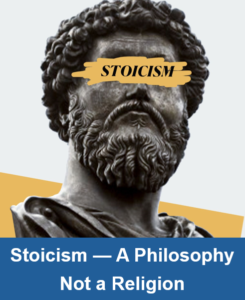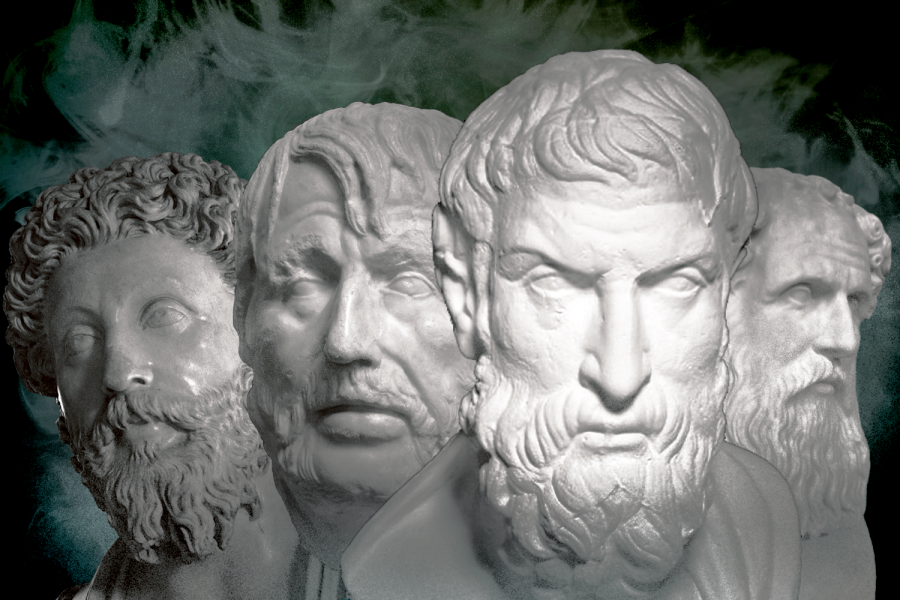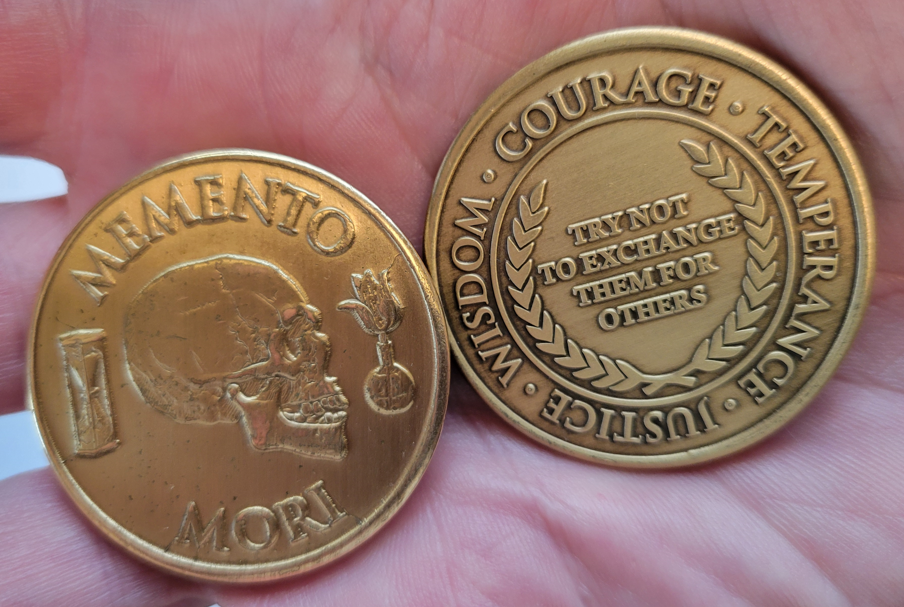 The term “stoicism” radiates a negative vibe through some folks. They feel Stoicism is a detached, don’t care, and humorless religion where a practicing Stoic leads a selfish existence without contributing to society or helping fellow human beings. Nothing is further from the truth. In fact, true Stoics follow an ancient, common sense, and proven lifestyle where doing good, being righteous, and having fun are paramount. Stoicism is a philosophy, not a religion.
The term “stoicism” radiates a negative vibe through some folks. They feel Stoicism is a detached, don’t care, and humorless religion where a practicing Stoic leads a selfish existence without contributing to society or helping fellow human beings. Nothing is further from the truth. In fact, true Stoics follow an ancient, common sense, and proven lifestyle where doing good, being righteous, and having fun are paramount. Stoicism is a philosophy, not a religion.
Yes, stoicism is a philosophy—a methodology—a life view dating back twenty-three hundred years to the robe-wrapped Greeks where emerging philosophers met under a “stoa poikile” in central Athens which was a painted portico or porch where they held a “symposium” (translated to a “drinking party”). Fundamentally, they guzzled red wine, got shit-faced, and talked about relevant stuff. Athenians called them “Stoics”.
Stoicism’s practice has never gone away, although for centuries it went underground, being overshadowed and somewhat extinguished by strict conventional religions. Today, there’s a huge resurgence in studying Stoicism, seeing it as a practical rather than an abstract philosophy. Just look at what Ryan Holiday has created with his Daily Stoic podcast and blog site. Ryan has well over a million followers, and he hosts highly insightful, delightful guests.
I recently deep-dived into Stoicism. It was part of research and development for an entertainment series I’m creating, City Of Danger, where a lead character is a practicing Stoic. My rabbit hole led me to reading Meditations written by Roman Emperor Marcus Aurelius in AD 161-180. It was enlightening, to say the least. I’ll go into what Meditations speaks to, but first let’s have a Cliffsnotes version of what Stoic philosophy really is.
 At its core, Stoicism teaches you to attend to things you can control and dismiss things you can’t control. Virtue is the highest good in Stoicism, and there are four core virtues in Stoic teachings—wisdom, temperance, courage, and justice.
At its core, Stoicism teaches you to attend to things you can control and dismiss things you can’t control. Virtue is the highest good in Stoicism, and there are four core virtues in Stoic teachings—wisdom, temperance, courage, and justice.
Wisdom is knowledge. “The chief task in life is simply this. To know and separate matters so I can clearly say to myself which are externals not under my control, and which have to do with the choices I actually control. Where then do I look for good and evil? Not to uncontrollable externals, but within myself to the choices that are my own.” ~Epictetus
Temperance is moderation. “If you seek tranquility, do less. Do what’s essential—what the logos of a social being requires, and in the requisite way. Which brings a double satisfaction: to do, less, not better. If you can eliminate it, you’ll have more time and more tranquility. Ask yourself at every moment, is this necessary.” ~Marcus Aurelius
Courage is action. “Life is like a military campaign. One must take action, serve on watch, act in reconnaissance, fight on the front line. So it is for us—each person’s life is like a battle. You must act like a soldier. Two words of action must be committed to memory and obeyed. Persist and resist.” ~Epictetus
Justice is righteousness. “Commit to justice in your own acts. Which means thought and action resulting in the common good. What you were born to do. Justice is the source of the other three virtues. After all, how impressive is courage if it’s only about self interest? What good are temperance and wisdom if not put to use for the whole world?” ~Marcus Aurelius
Epictetus and Marcus Aurelius were only a few of the ancient Stoics. Actually, Marcus Aurelius never claimed to be a philosopher—only a student of Stoics like Epictetus. And while Marcus Aurelius was the most powerful ruler in the world during his time, Epictetus was merely a crippled slave—a poor man who, arguably, became the most influential Stoic in history.
Other notable Stoics of history were Zeno (334-262 BC) who started the movement, studying under Cleanthes (331-232 BC) after being shipwrecked and financially ruined. Lucius Seneca (4 BC – 65 AD) was another Stoic philosopher who was perhaps the most outspoken. If you want to hear reality and plain truth, read Seneca’s On the Shortness of Life. He’s brutally straightforward.
Ryan Holiday is, in my opinion, the most influential of modern Stoics. He mentors leading sports figures, military commanders, and political leaders in person, as well as common guys like me online. Sahil Bloom is an emerging Stoic who I find completely credible and motivating. And there’s no one like Thomas Sowell to tackle life’s big issues and put them in Stoic perspective.
Aside from these ancient and current thought leaders’ influence, there are no bounds to what you, as an individual, can benefit from by studying Stoicism. After all, Stoicism is a philosophy, not a religion. It’s a methodology—an outline for living well, doing good, and enjoying life—a smorgasbord where you can take what you need and leave the rest.
Philosophy comes from the Greek word “philosophos” which means the love of wisdom. Stoic philosophy doesn’t evoke a higher power or enforce strict practitional dogma. It’s a collection of views based upon a collective experience—an experience gleaned from understanding the dichotomy of what you can control and what you cannot control. In other words, being stoic.
Another core principle of Stoicism is valuing your limited time. Memento Mori is an often-heard saying. Translated from Latin, it equates as “remember death” or to “appreciate the moment”. It’s also said, “You could leave life right now”. You’ll often see a Memento Mori image with a tulip representing life, a skull portraying death, and an hourglass reminding you of time. Many practicing Stoics carry Memento Mori and Four Virtues medallions in their pocket.
Although Greek was the main language used by the early Stoics, Latin is the most common carrier of Stoic quotes. Here are a few common Latin sayings and translations you’ll find in a brief study of Stoicism:
Summum Bonum — Living well, highest good, true virtue.
Festina Lente —Make haste slowly, faster is not better.
Carpe Diem — Seize the day, waste no time.
Fac, Si Facis — Do it, if you’re going to do it. Let the rubber hit the road.
Quidvis Recte Factum Quamis Humile Praeclarum — Whatever is rightly done, however humble, is noble.
Semper Fidelis — Always faithful, do the right thing.
Per Angusta Ad Augusta — Through difficulties to honors, the obstacle is the way.
Amor Fati — Love of fate, a reason, a purpose.
Fatum Ingenium Est — Character is fate, destiny.
Semper Anticus — Always forward, keep going, get better.
Vivere Militare Est — To live is to fight, train, life kicks us around.
Part of my research process in any subject is to encapsulate the key points on paper. I use sheets of 11 x 17 white bond and basically map out the concept and highlight the takeaways. Last week I took time off, and I did this mapping thing with the ideas of Stoicism and with the content of Meditations written by Marcus Aurelius. See the images. (Note from my wife: What kind of guy goes on vacation and spends his time perched at a woodland picnic table by our cottage reading and annotating scriptures quilled by an old dead Roman?)
I didn’t find Meditations to be an easy read, but it helps to know the context in which it was written. Scholars agree that Marcus Aurelius, who wrote it in Greek, never intended this work to be public. These were private thoughts that he journaled for himself during his period as Roman Emperor from 161 to 180 AD. There are twelve parts or “books” to Meditations, and they show a continual progression and evolving simplicity of his views on life. Particularly on death.
Scholars also agree that the books have nothing to do with mental meditation which is generally perceived to be a relaxation method. Likely, the works were never titled “Meditations” and nowhere in the text is the translation for “meditation” found. Some critics claim the work is a hoax as the documents didn’t surface until a thousand years after Marcus Aurelius’ death.
The original Greek to Latin manuscripts are said to be housed in the Vatican and are not available for public view. Numerous translations exist in English and other languages. Note that Marcus Aurelius spoke Latin as a working language but wrote in Greek which was the scholarly language of the day. The English version I read was prepared by Gregory Hays and is the version recommended by Ryan Holiday who offers an online course in how to read and interpret Meditations. It was a challenging read, but by following the course I found it well worth the time to help understand the Stoic mindset.
Stealing from Ryan Holiday and The Daily Stoic, here are 12 Stoic Rules for Life:
- Own the morning.
- Focus on what’s in control.
- Don’t suffer with imagined troubles.
- Treat success and failure equally.
- Do one thing every day.
- Make beautiful choices.
- Ask “Is this necessary?”
- Love your fate.
- Speak with the dead.
- Be strict with yourself and be tolerant with others.
- Turn obstacles upside down.
- Memento Mori. Be aware of your mortality and love life.
And stealing from Marcus Aurelius and Meditations, I’ll leave you with this quote:
“When you need encouragement, think of the qualities of the people around you have: this one’s energy, that one’s modesty, another one’s generosity, and so on. Nothing is as encouraging as when the virtues of wisdom, courage, temperance, and justice are visibly embodied in the people around us, when we’re practically showered with them. It’s good to keep this in mind.” ~Marcus Aurelius








